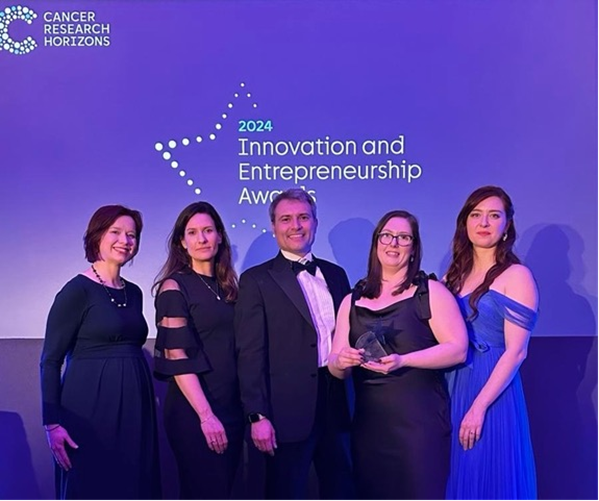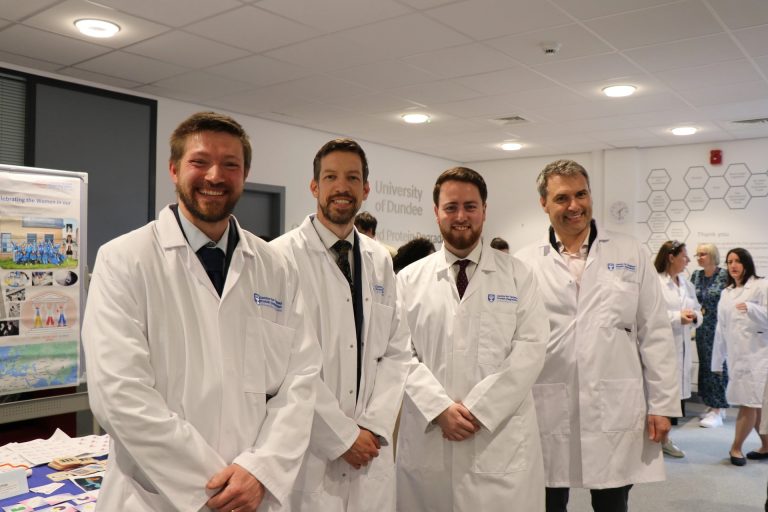
The Centre for Targeted Protein Degradation, at the University of Dundee, and Boehringer Ingelheim research collaboration (ACBI PROTAC Team) have secured the prestigious Cancer Research Horizons (CRH) – Innovation and Entrepreneurship Awards 2024 in the category Further, Faster, Together (Industry-Academia Collaboration). The CRH Innovation & Entrepreneurship Awards aim to celebrate researchers and innovators actively bridging the gap between oncology discoveries and tangible patient outcomes.
This accolade is a recognition of the exceptional teamwork and dedication shown by the team over the years.
The journey began in July 2016 when the collaboration was formally established, bringing together the expertise of Prof. Alessio Ciulli and his team (at the time based within the Division of Biological Chemistry and Drug Discovery) with Boehringer Ingelheim’s expertise in drug discovery and clinical development of new therapeutic agents. Since the incept, the team has focussed on translating fundamental academic discoveries into potential benefits for cancer patients through the development of proteolysis targeting chimeras (PROTACs); a revolutionary class of drugs that degrade proteins instead of only inhibiting them as conventional drugs do. The team’s pioneering structure-guided approach to PROTAC design has allowed them to drug previously “undruggable” cancer targets.
The partnership was expanded in both 2018 and 2021 and it has continued to thrive since, with a large multi-disciplinary team across the two organisations. The joint team’s research has led to the development of highly selective and potent first-in-class PROTACs against difficult-to-target proteins. Notable outcomes include the successful development of novel degraders with in vivo activity against two targets previously considered undruggable: the chromatin remodelling complex SMARCA2 (Farnaby et al. Nat. Chem. Biol. 2019; Kofink et al. Nat. Commun. 2022) and the cancer driver KRAS (Popow et al. BioRxiv 2023).
Moreover, the collaboration has embraced the ethos of open science. Several protein degraders developed by the joint team (including the SMARCA2 degraders ACBI1 and ACBI2) have been made freely available through OpnMe, an online portal established by Boehringer in 2017, thereby fostering a culture of knowledge exchange and advancing research initiatives for the benefit of patients with high unmet medical needs. The opnMe portal also provides access to two PROTAC degraders developed previously by the Ciulli academic group itself, namely the popular BET degrader MZ1 and the Brd7/Brd9 degrader VZ185.
The impact of this partnership extends beyond scientific breakthroughs. It serves as a model for effective academia-industry partnerships, as highlighted by Dr. Clive Wood, Corporate Senior VP, and Global Head at Boehringer, who stated, “Our collaboration with Professor Ciulli and colleagues has brought significant success. This is an exceptional joint team positioned to discover and advance medicines that strike at the root cause of cancer.”
On the evening of Wednesday 20th March, the ACBI team attended the Cancer Research Horizons Innovations and Entrepreneurship Award Ceremony in central London. The team was represented at the ceremony by Alessio, Kirsten McAulay (ACBI team collaboration leader), Vesna Vetma (Senior Scientist, Cell Biology), Aileen Frost (Senior Scientist, Medicinal Chemistry), as well as Stephanie Glaser from Boehringer Ingelheim (Director for Alliance Management at BI’s Global of Business Development and Licensing Boehringer Ingelheim). We were delighted and slightly surprised to be named as winner as we shared the prize with the Edinburgh University / Nuvectis, a collaboration deal which Maria Lopalco helped to secure during her previous tenure at Edinburgh (so a double-win for her!).
Following the announcement of the award, Alessio offered a brief speech where, on behalf of the whole team, he thanked the committee and extended our congratulations to all colleagues at Dundee involved in the establishment and support of our successful collaboration over so many years, with particular mention to Anne Muir at RIS who helped to establish and manage the collaboration, the ACBI team leaders, Will Farnaby since 2016 and Kirsten since 2022, who have impeccably led the team at Dundee, and all our colleagues at BI who have championed the collaboration over the years. This achievement will be duly celebrated also at the upcoming joint QR/JSC in-person meeting in Dundee in May!
In conclusion, this collaboration between the University of Dundee and Boehringer Ingelheim serves as a beacon of innovation in academia-industry partnership, exemplifying the true spirit of teamwork and offering a pioneering model for others to emulate.

